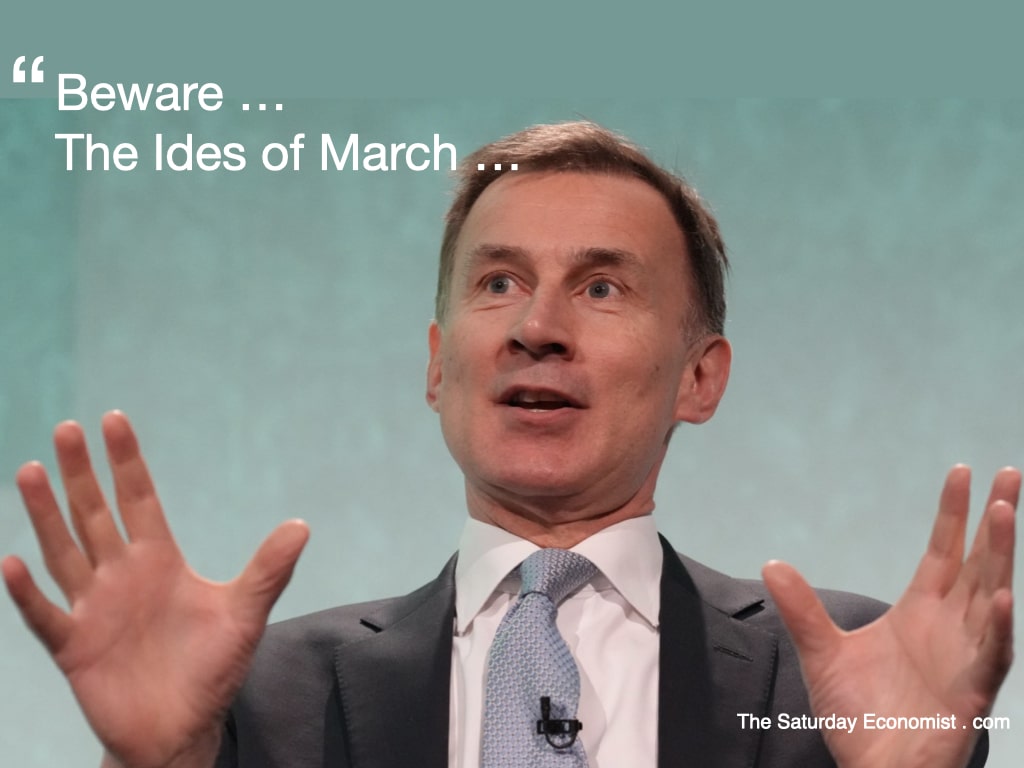|
Beware The Ides of March ... The Bond Vigilantes are watching ...
Good news for the Chancellor last week. The government borrowed £5 billion less than expected in the first nine months of the financial year. The chancellor, is now estimated to have between £15 billion and £20 billion to spend on his budget in March. What a stroke of luck! OK don't look too much at the detail, borrowing was up by £11 billion compared to the same period last year. That's an increase of 10%. Pro rata the government is set to borrow £145 billion in the financial year, compared to £130, billion last year. Great things are expected in the January tax receipts data, out next month, to bring borrowing into line with the OBR's £124 billion forecast, so watch this space. In detail, the government borrowed £119.1 billion in the period from April to December, according to the Office for National Statistics, lower than the £124.1 billion projected by the OBR, in the November autumn statement. For the month of December borrowing was £7.8 billion, much lower than the £11 billion forecast by City analysts and the lowest amount in five years. Debt interest spending fell sharply to £4 billion, down by £14.1 billion compared with December 2022, reflecting lower inflation and market interest rate expectations. The OBR commented "The difference with our forecast is primarily explained by debt interest payments, which were $5.7 billion below our forecast profile last month. Inflation has fallen faster than expected. This drop has lowered the amount of cash that the government pays holders of its debt, a large share of which is tied to the retail price index. The latest data increases the chances of Jeremy Hunt cutting taxes in the budget on March 6. The chancellor, is estimated to have between £15 billion and £20 billion to spend at his budget in March. "It's all a bit rum" says David Smith writing in the Times ... "Last autumn the chancellor thought he would have no room for manoeuvre, until a change of forecast from the OBR provided him with the scope to announce a two percentage point reduction in employee national insurance contributions and make "full expensing" permanent. Until then, the autumn statement would have been very thin gruel". says Smith.. "It is, as I say, all a bit rum. In the space of a few weeks in the autumn, the OBR, moved from a position in which the Chancellor had no money to play with, to one where he could announce some crowd pleasers because of the effect of higher inflation on tax revenues. In the few weeks since then, it seems it has moved from a position in which he had used up all his bounty, to one where he can provide even more crowd pleasers." Now it would appear the debt interest payments have been recalculated, to massage way the onerous debt service burden, in the months prior to preparation on the March budget forecasts.
0 Comments
Leave a Reply. |
The Saturday EconomistAuthorJohn Ashcroft publishes the Saturday Economist. Join the mailing list for updates on the UK and World Economy. Archives
July 2024
Categories
All
|
| The Saturday Economist |
The material is based upon information which we consider to be reliable but we do not represent that it is accurate or complete and it should not be relied upon as such. We accept no liability for errors, or omissions of opinion or fact. In particular, no reliance should be placed on the comments on trends in financial markets. The presentation should not be construed as the giving of investment advice.
|
The Saturday Economist, weekly updates on the UK economy.
Sign Up Now! Stay Up To Date! | Privacy Policy | Terms and Conditions | |

 RSS Feed
RSS Feed